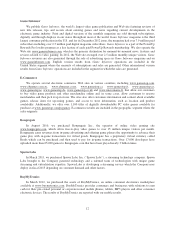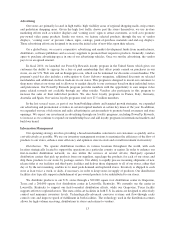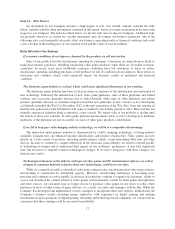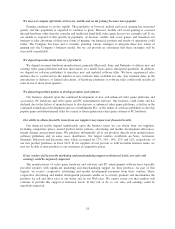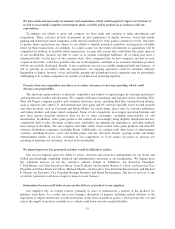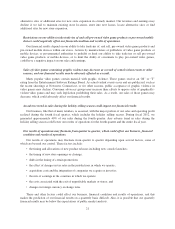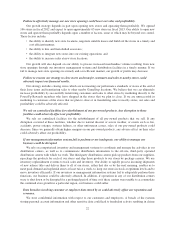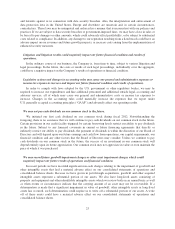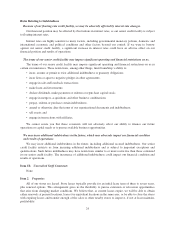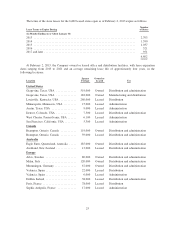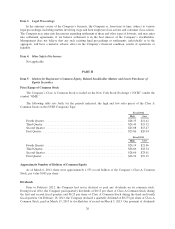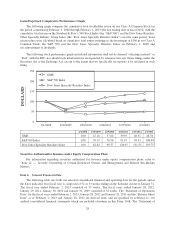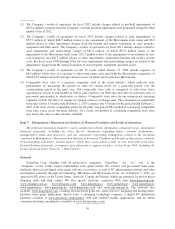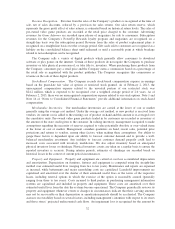GameStop 2012 Annual Report Download - page 37
Download and view the complete annual report
Please find page 37 of the 2012 GameStop annual report below. You can navigate through the pages in the report by either clicking on the pages listed below, or by using the keyword search tool below to find specific information within the annual report.Failure to effectively manage our new store openings could lower our sales and profitability.
Our growth strategy depends in part upon opening new stores and operating them profitably. We opened
146 stores in fiscal 2012 and expect to open approximately 65 new stores in fiscal 2013. Our ability to open new
stores and operate them profitably depends upon a number of factors, some of which may be beyond our control.
These factors include:
• the ability to identify new store locations, negotiate suitable leases and build out the stores in a timely and
cost efficient manner;
• the ability to hire and train skilled associates;
• the ability to integrate new stores into our existing operations; and
• the ability to increase sales at new store locations.
Our growth will also depend on our ability to process increased merchandise volume resulting from new
store openings through our inventory management systems and distribution facilities in a timely manner. If we
fail to manage new store openings in a timely and cost efficient manner, our growth or profits may decrease.
Failure to execute our strategy to close stores and transfer customers and sales to nearby stores could
adversely impact our financial results.
Our strategy includes closing stores which are not meeting our performance standards or stores at the end of
their lease terms and transferring sales to other nearby GameStop locations. We believe that we can ultimately
increase profitability by successfully transferring customers and sales to other stores by marketing directly to the
PowerUp Rewards members who have shopped in the stores that we plan to close. If we are unsuccessful in
marketing to customers of the stores that we plan to close or in transferring sales to nearby stores, our sales and
profitability could be adversely affected.
We rely on centralized facilities for refurbishment of our pre-owned products. Any disruption to these
facilities could adversely affect our profitability.
We rely on centralized facilities for the refurbishment of all pre-owned products that we sell. If any
disruption occurred at these facilities, whether due to natural disaster or severe weather, or events such as fire,
accidents, power outages, systems failures, or other unforeseen causes, sales of our pre-owned products could
decrease. Since we generally obtain higher margins on our pre-owned products, any adverse effect on their sales
could adversely affect our profitability.
If our management information systems fail to perform or are inadequate, our ability to manage our
business could be disrupted.
We rely on computerized inventory and management systems to coordinate and manage the activities in our
distribution centers, as well as to communicate distribution information to the off-site, third-party operated
distribution centers with which we work. The third-party distribution centers pick up products from our suppliers,
repackage the products for each of our stores and ship those products to our stores by package carriers. We use
inventory replenishment systems to track sales and inventory. Our ability to rapidly process incoming shipments
of new release titles and deliver them to all of our stores, either that day or by the next morning, enables us to
meet peak demand and replenish stores at least twice a week, to keep our stores in stock at optimum levels and to
move inventory efficiently. If our inventory or management information systems fail to adequately perform these
functions, our business could be adversely affected. In addition, if operations in any of our distribution centers
were to shut down or be disrupted for a prolonged period of time or if these centers were unable to accommodate
the continued store growth in a particular region, our business could suffer.
Data breaches involving customer or employee data stored by us could adversely affect our reputation and
revenues.
We store confidential information with respect to our customers and employees. A breach of the systems
storing personal account information and other sensitive data could lead to fraudulent activity resulting in claims
22


